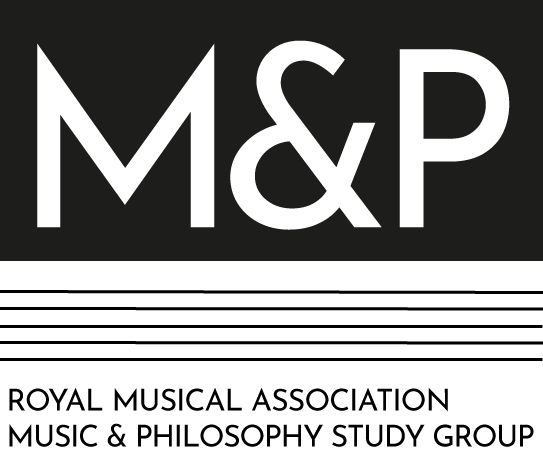Music and Philosophy Event: Research Training Day at the IMR, London, 5 March
This is to announce a Research Training Day in Music and Philosophy, to
be held at the IMR (Institute of Musical Research), London, 5 March.
More information and details of how to register are available at
http://music.sas.ac.uk/index.php?id=1151
*IMR Research Training Day*
5 March 2012
‘Music and Philosophy’
Convenors: Nanette Nielsen (University of Nottingham), Tomas McAuley
(King’s College London)
The interaction between philosophy and music is rich and varied: discussions of music have a long-established history of engaging with philosophical issues, while music has often been taken as an object of philosophical investigation. Music has, furthermore, often challenged
and shaped philosophical thought. This training day brings together scholars from both musicology and philosophy, each of whom will present recent work contributing to the ongoing discussion between the two disciplines. Providing ample opportunity for dialogue and debate in a group setting, the aim is to inspire ideas, methodologies, and approaches relevant to both music and philosophy. Complementing work undertaken by the Royal Musical Association Music and Philosophy Study Group (RMA MPSG), this day can also be seen as a prelude to the 2nd Annual Conference to be held by the Study Group in July, for which the optional theme is ‘Meaning and Ineffability’.
Prof. Matthew Kieran (University of Leeds)
Composers often encounter writer’s block, a state that can be deeply frustrating and is often associated with depression. However, not all cases of creative inactivity or procrastination are alike. Kieran will explore when, where and why artists may be responsible for such creative inactivity or suffer from it as a result of conditions visited upon them. In doing so we will go on to consider how creative paralysis may result from perfectionism, fear and lack of fortitude. Whilst we should be careful not to confuse causes and effects, and we ought to recognize that cases are invariably complex, there may be good reason to think that writer’s block sometimes manifests creative vices.
Dr Nanette Nielsen (University of Nottingham) will draw on her recent book Music and Ethics (Ashgate, 2012, co-authored with Marcel Cobussen), and explore ways that philosophy can be an aid to musicology in the field of ethical criticism. She will include a critique of Peter Kivy’s recent chapter on ‘Musical Morality’, and contrast it with other recent contributions in this area (McClary, Taruskin, Critchley). She will also
consider the possibilities for ethical criticism in relation to the complex philosophical issue of ‘freedom’, looking in particular at musical creativity in 1920s Germany. The focal point for discussion here will be a forthcoming article on Krenek’s opera Jonny spielt auf.
Prof. Max Paddison (Durham University)
One of the big issues in philosophical aesthetics concerns questions of ‘meaning’ and ‘truth’ in art, and in particular in music. When propositional meanings can only be applied to music with great difficulty, if at all, then can we talk of ‘meaning’ in such a context? Drawing on a range of his publications from recent years, including Contemporary Music: Theoretical and Philosophical Perspectives (Farnham: Ashgate, 2010), edited with Irène Deliège, and also Musicae Scientiae (issue: Aspects of Time in Creation of Music, 2004), Paddison will put forward a number of proposals for discussion in this paper, with particular reference on the one hand to theorists and philosophers like L. B. Meyer, Roger Scruton, and Peter Kivy, and on the other to Adorno and critical theory.
The three speakers will be joined by Tomas McAuley (doctoral candidate, King’s College London), who will explore some of the challenges facing doctoral researchers in this area. Drawing on his experience as Founding Chair of the RMA MPSG, he will examine how involvement in such research networks can both assist and complicate doctoral study. Presenting a snapshot of his own research, he will investigate some of the ways in
which philosophy has impacted historically on musical thought. His focus will be on the birth, in the late eighteenth century, of a new view of music according to which music can provide non-linguistic knowledge. Musicologists have explored in depth the possible sources of this new view of music in contemporary music and in contemporary philosophical conceptions of art. McAuley will supplement and question this rich literature by examining the role of contemporary philosophy unconcerned even with art in general.
Schedule
10.45–11.10: Assemble/coffee
11.10: Introduction TM/NN
Music and Philosophy: four challenges
11.15–11.45: NN On the ethics of discourse about music
11.45–12.15: MK On character and creativity
12.15–12.45: MP On problems of meaning and truth in music: Adorno and others
12.45-13.15: TM On music history without music
13.15-14.15: LUNCH
Case studies
14.15–14.45: MK
14.45–15.15: MP
15.15-15.45 Tea
15.45-16. 15 NN
16.15-16.45: TM
16.45-17.30: General discussion and windup. (This will include advice on
career avenues/job prospects, publication opportunities, and other
practicalities.)
****
Dr Nanette Nielsen
Department of Music
School of Humanities
The University of Nottingham
University Park
Nottingham NG7 2RD
t: +44 (0)115 951 4761
f: +44 (0)115 951 4756
http://www.nottingham.ac.uk/music/people/nanette.nielsen
www.nottingham.ac.uk/moss



